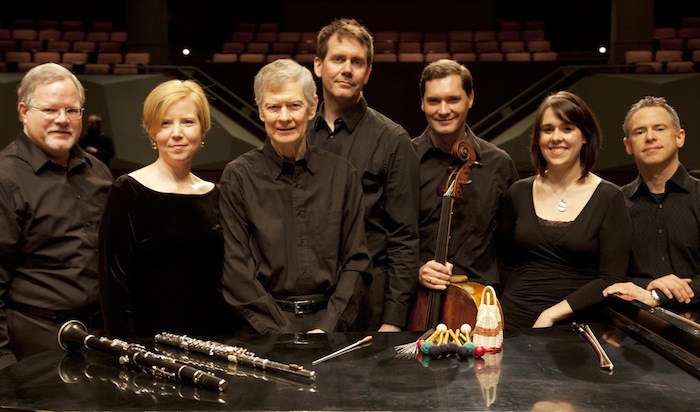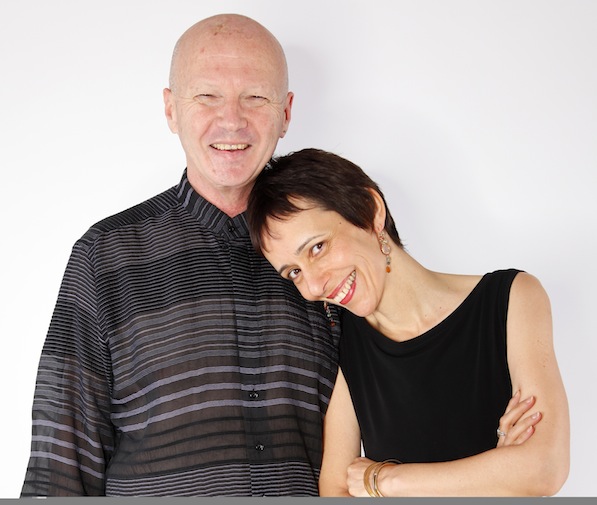Concert Review: Vessels of Song — Boston Musica Viva Marks Rosh HaShanah
The marvel of Assembly of Souls is how composer Eitan Steinberg deploys diverse musical strategies from the ancient to the avant-garde and keeps them in productive juxtaposition and conscientious balance.
World of Klezmer, Boston Musica Viva at Tsai Performance Center, Boston, MA, on September 27.
By Debra Cash
The Saturday night after Rosh HaShana 5775 was an apropos time to stage Boston Musica Viva’s World of Klezmer program, which opened the new music ensemble’s 46th season. (This, director Richard Pittman explained with evident pride, makes BMV the oldest extant new (classical) music ensemble in the country.) The title was a bit off: Pittman’s focus on 20th and 21st century Jewish music had only a few episodes of up-from-the-shtetl musical influence. What it did offer was a direct line into the etymological wellspring of klezmer as “klei-zemer” or vessels of song. It also had a glamorous container in the extended vocal techniques and multicultural stylings of Israeli singer Etty BenZaken performing the works of her husband and long-time collaborator, composer Eitan Steinberg.
Vessels hollowed out and dark with mystery, vessels pressured and shattered with divine longing, Eitan Steinberg’s Assembly of the Souls, receiving its world premier, implicitly references the connections between the mystical traditions of Isaac Luria and the Jewish kabbalists on one hand and Sufi saint Abu al-Hassan al-Nuri on the other. The marvel is how Steinberg deploys diverse musical strategies from the ancient to the avant-garde and keeps them in productive juxtaposition and conscientious balance.
Steinberg wrote Assembly of the Souls against the backdrop of the past summer’s war in Gaza, exploring classical religious texts that addressed the duality of morality and destruction. Like many Israelis, the composer doesn’t consider himself religious, but the practices of synagogue and mosque permeate his soundscape.
Assembly of the Souls opens with a skittering, sibilant, emphatic, improvisatory whisper that flows above a watery sustaining line for marimba, flute, and accordion; Hebrew words briefly rise into legibility and are again submerged. (Steinberg builds a similar effect in his 2012 chamber ensemble Dancing Memory Fish, which is also about memory, the deconstruction and reconstruction of both musical and spoken language, and the tension between randomness and order. BenZaken demonstrates some of those techniques in the video below at 7:15.)
BenZaken is the daughter of an Egyptian, Arabic-speaking father and a Turkish, Ladino-speaking mother (their shared household language was French), and singing in comprehensible Arabic, her warm mezzo lullaby emerges from Sufi metaphors of nature and divine grace. The work closes — and I think Steinberg means it to ascend into a shared realm — with BenZaken’s passionate direction of the climbing and descending lines of a wordless Hasidic melody.
Like Steve Reich in Tehillim, Steinberg has taken on the challenge of using culturally resonant modalities and contemporary musical ideas to realize a religiously untethered sacred language. To my mind, with Assembly of the Souls, Eitan Steinberg is working in Pulitzer contention territory.
Another aspect of Steinberg’s body of work is his settings of folk songs that reflect the multilingual sources of Israeli culture. Rather than offering a monolithic nationalism, and avoiding saccharine sentimentality, each song is flavored with a distinctive spice.

Boston Musica Viva — the oldest extant new (classical) music ensemble in the country. Photo: courtesy of BMV.
The crowd-pleasing Joy suite, arranged by the composer for the instrumentalists of Boston Musica Viva, moves between a prayer of praise from the Jews of 19th century Syria; a wedding song from Kerala, India (Kappalile) sung in Malayalam; and a rousing accumulative song Dice la nuestra novia sung in a dialect of Ladino used by the Spanish Jews of Morocco.
Eitan Steinberg’s work — along with a throw-away setting of two traditional klezmer songs led by clarinetist William Kirkley, who performed them with a time signature that was too devout — was supplemented on Saturday’s program by the rarely performed Aaron Copland Vitebsk piano trio from 1929. Vitebsk was Copland’s hometown — Chagall grew up there, too — and in the first part of the 20th century, half of its population was Jewish. Subject to pogroms at the time of the composition and decimated during the genocide that was to follow a decade later, Copland’s repurposing of a folk song from The Dybbuk, which he’d seen in New York a few years earlier, is self-consciously modern, sitting under the dark wing of Ives’ Unanswered Question. BMV’s Gabriela Diaz (violin), Jan Muller-Szeraws (cello) and Geoffrey Burleson (piano) gave it a muscular reading, with evocative shifts of focus between in work’s inner and outer voices.
I.B. Singer wrote the libretto for David Schiff’s opera Gimpel the Fool in 1979, and while I haven’t heard the opera, the Divertimento from Gimpel the Fool that Schiff arranged in 1982 for clarinet, violin, cello, and piano exemplifies Singer’s souped-up spin on folklore. Schiff is an able colorist, and Gimpel’s wedding waltz is a nice blend of delicacy and get-out-your-handkerchiefs schmaltz. Somehow it seemed fitting that all but the final movement left us hanging, and longing, for resolution.
Debra Cash has reported, taught and lectured on dance, performing arts, design and cultural policy for print, broadcast and internet media. She regularly presents pre-concert talks, writes program notes and moderates events sponsored by World Music/CRASHarts and cultural venues throughout New England. A former Boston Globe and WBUR dance critic, she is a two-time winner of the Creative Arts Award for poetry from the Hadassah-Brandeis Institute and will return to the 2014 Bates Dance Festival as Scholar in Residence.
c 2104 Debra Cash
Tagged: Assembly of the Souls, Boston-Musica-Viva, Eitan Steinberg, Etty BenZaken, klezmer, Richard-Pittman

